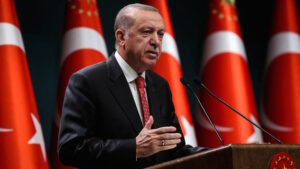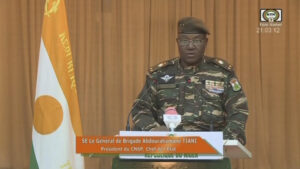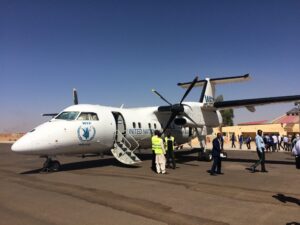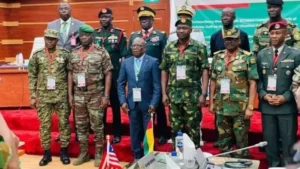Niger’s Junta Gives French Ambassador Unexpected ‘Au Revoir’ Notice, France Responds with a ‘Non, Merci
Tensions between France and Niger’s military junta have escalated as the French government dismisses the junta’s demand for the departure of their ambassador. The military rulers, who assumed control of Niger on July 26, had given French ambassador Sylvain Itte 48 hours to leave the country. However, the French Foreign Ministry has responded, stating that the junta lacks the authority to make such a demand.
In a statement to AFP, the French Ministry of Foreign Affairs asserted, “France has taken note of the putschists’ request. The putschists do not have the authority to make this request, the ambassador’s approval coming solely from the legitimate elected Nigerien authorities.” The Ministry emphasized that the security and operational situation of their embassy is continually being evaluated.
The junta’s decision to expel the French ambassador came in response to Itte’s refusal to attend a scheduled meeting with the Nigerien foreign minister, along with other actions they view as contrary to Niger’s interests. This move follows a series of anti-France statements and protests since the overthrow of President Mohamed Bazoum by the Nigerien military.
The military leaders have accused France of seeking to militarily intervene in Niger to reinstate Bazoum. They have also criticized the Economic Community of West African States (ECOWAS), alleging it to be under the influence of former colonial power France. ECOWAS had imposed severe economic sanctions on Niger following the coup and had even threatened the use of force to restore constitutional order.
France, in its effort to combat jihadist groups in the region, has approximately 1,500 troops stationed in Niger. These troops play a crucial role in tackling the persistent threat of extremist groups in both Niger and the wider Sahel region.
The junta’s actions have escalated, with the closure of emergency services, including electricity and water, at the French Embassy in the capital city of Niamey. Furthermore, reports indicate that no external food supplies are allowed to enter the embassy. This move highlights the junta’s determination to confront foreign influence.
In a subsequent development, the French consulate in Zinder, Niger, also faced similar measures. The President of the National Support Committee for the Safeguarding of the Country (CNSP), Elh Issa Hasumi Borima, ordered the suspension of water, electricity, and food supplies to the French base in Zinder. Additionally, he warned of consequences for those aiding the French in the supply of goods and services.
As tensions between the junta and France escalate, the international community watches closely, concerned about the potential repercussions on diplomatic relations and stability in the region
Niger’s Junta Gives French Ambassador an Unexpected ‘Au Revoir’ Notice
Niger’s junta has ordered the French ambassador, Sylvain Itte, to leave the country within 48 hours. The Nigerien Foreign Ministry stated that this decision was made after Itte refused to attend a scheduled meeting with the country’s foreign minister and due to other actions by the French government seen as against Niger’s interests. The French Foreign Ministry responded, asserting that the junta lacks the authority to demand the ambassador’s departure and that his
Sky Standoff: Algeria Denies French Request for Airspace, France Denies Seeking It Amid ECOWAS Military Intervention in Niger
As conflicting statements regarding military involvement in Niger continue to circulate on the internet, attention is drawn to reports indicating Algeria’s refusal to grant France’s request for the use of its airspace in a potential military operation within Niger. The state radio broadcast this news, which gained traction late on Monday.

According to the state radio’s account, Algeria’s decision is grounded in its steadfast opposition to external military interference in neighboring Niger. The nation emphasizes the primacy of diplomatic channels in restoring constitutional order and stability. The report, originally presented by Lamine Chikhi, underwent editing under Alison Williams’ supervision.
In response, the French armed forces issued a denial on Tuesday, refuting claims that they had formally sought Algeria’s airspace for a military operation in Niger. This denial follows the initial announcement by Algerian state radio, which had asserted the existence of a request for airspace access that was ultimately rebuffed by Algeria. Notably, the state radio is a recognized platform for conveying Algeria’s official positions.
This situation highlights Algeria’s resolute stance against foreign military interventions aimed at rectifying the aftermath of Niger’s July 26th coup. Instead, Algeria advocates for diplomatic resolutions to address the crisis and reinstate constitutional order. With divergent perspectives shaping the unfolding narrative, the situation remains dynamic.
Turkish President Erdogan Opposes ECOWAS Military Intervention in Niger Crisis; Algeria j Diplomacy
Turkish President Recep Tayyip Erdogan has strongly condemned the proposed military intervention in Niger by the Economic Community of West African States (Ecowas), warning that it could result in regional instability. Erdogan, aligned with Egypt, Algeria, and other nations, insists that ignoring the potential consequences of such a move would be reckless, leading to heightened tensions in the entire region.

Erdogan’s stance comes amidst Ecowas’ consideration of foreign military action against Niger’s coup leaders. He expressed concern that such intervention would not be the right approach and could escalate instability, echoing sentiments voiced by Mali and Burkina Faso who view the intervention as a declaration of war against them. The Turkish president advocated for a swift return to constitutional order and democratic governance in Niger, emphasizing his support for the people’s democratic rights.
Meanwhile, Algeria has taken a diplomatic path in addressing the Niger crisis. As Ecowas contemplates intervention following the removal of democratically elected President Mohamed Bazoum, Algeria seeks to address the crisis through diplomatic channels. This approach aligns with the regional bloc’s call for intervention, aiming to stabilize the situation and restore democratic governance. Algeria’s commitment to diplomatic resolution underscores the complexity of the crisis and the importance of regional cooperation in finding a peaceful solution.
ECOWAS Gives Side-Eye to Niger Coup Leader’s Three-Year Democracy Plan
The Economic Community of West African States (ECOWAS) has rejected the pledge by the leader of Niger’s recent coup to restore civilian governance within three years. Following discussions with ECOWAS mediators in Niamey, the coup leader, Gen. Tchiani, declared this intention but did not provide specific details about the transfer of authority. The transition’s fundamental principles are expected to be determined within a month through a “dialogue” organized by the coup leaders.

Despite this announcement, ECOWAS Security and Peace Director Abdel-Fatau Musah remains resolute, emphasizing that ECOWAS will persist until constitutional order is swiftly reinstated. Meanwhile, Counter Terrorism expert David Otto has urged the Niger coup leader to outline a clear strategy for achieving the restoration of constitutional rule within the suggested three-year timeframe.
Niger Nationals in Kano State Raise Voices Against Coup: ‘Bazoum-ing’ for Democracy
In a resolute display of disapproval, Niger Republic citizens residing in Nigeria’s Kano State have come forward to denounce the recent military coup that unseated the democratically elected government of President Mohamed Bazoum. The condemnatory sentiments were fervently expressed during a peaceful protest on August 19th, underscoring the protesters’ plea for the swift release of President Bazoum, his family, and all individuals allegedly taken captive amidst the military intervention on July 16, 2023.

The demonstrators, led by Lawalli Barma, the Chairman of the group, extended an unwavering appeal for the immediate freedom of President Bazoum, his family, and the other abducted individuals. Calling for the restoration of democratic governance within the Niger Republic, the group emphasized the necessity of dialogue as opposed to military conflict.
In a collective voice, the protesters urged the Economic Community of West African States (ECOWAS) to reconsider their decision to deploy military forces in Niger Republic. Instead, they advocated for prioritizing peaceful negotiations to navigate through the ongoing crisis.
Amidst the peaceful demonstration, Lawalli Barma also lauded President Bazoum’s endeavors to advance the economic landscape of the Niger Republic. The Chairman highlighted the President’s dedication to capacity building, which significantly propelled human and capital resources forward. Moreover, the protesters celebrated the notable strides achieved in political, economic, and social development during President Bazoum’s tenure.
However, the group expressed disappointment in the actions of Presidential Guard General Abdoul Rahamane Thiani, underscoring the pivotal role the General was entrusted with in ensuring the President’s safety.
Before the military intervention took hold of the Niger Republic, the nation had been enjoying a period of tranquility, economic solidity, and political progress under the leadership of President Bazoum
ECOWAS Braces for Potential Intervention as Gen Tchiani Commits to Civilian Rule in Niger within 3 Years 🛡️🕊️
Niamey, August 20, 2023 — Gen Abdourahamane Tchiani, the leader of the recent military coup in Niger, has declared his commitment to restoring civilian rule within a three-year timeframe. The announcement came following a meeting with mediators from the West African regional bloc ECOWAS (Economic Community of West African States) in the capital city of Niamey.

The stakes have been high since the coup, with ECOWAS threatening military intervention to reverse the ousting of President Mohamed Bazoum if diplomatic talks were to fail. Addressing the nation in a televised statement on Saturday evening, Gen Tchiani emphasized Niger’s reluctance to engage in warfare but asserted the nation’s resolve to defend itself against any foreign intervention. He cautioned, “If an attack were to be undertaken against us, it will not be the walk in the park some people seem to think.”
Thousands of individuals assembled at a stadium in Niamey on Saturday to register for a potential volunteer force in case of invasion. However, the registration process was hindered due to overcrowding, as reported by Reuters news agency.
Gen Tchiani criticized the sanctions imposed by ECOWAS, referring to them as “illegal and inhumane.” These sanctions have caused significant disruption, including electricity cuts leading to blackouts in major cities like Niamey, as well as the blockage of crucial imports. The consequences of these sanctions have also been felt by lorry drivers who have been stranded for weeks, resulting in supply shortages and increased food prices.
“Sanctions are not conceived with the aim of finding a solution but to bring us to our knees and humiliate us,” Gen Tchiani declared. While he did not elaborate on the specifics of the power transition, he announced that the principles for the transition would be determined within the next 30 days during a “dialogue” hosted by the coup leaders.
As of now, ECOWAS has not released an official response to Gen Tchiani’s announcement. The mediators who visited Niger on Saturday had also met with detained President Mohamed Bazoum and his family. The delegation, led by former Nigerian military leader Gen Abdulsalami Abubakar, included Nigeria’s prominent Muslim leader, the Sultan of Sokoto, Muhammadu Sa’adu Abubakar III. The Sultan’s involvement holds particular significance due to the historical influence of the Sokoto Caliphate in Niger before the colonial era.
This meeting marked the first direct interaction between the junta leaders and ECOWAS representatives. The international community continues to watch closely as tensions in Niger remain high amid calls for a peaceful resolution and the restoration of democratic governance
Countdown Initiated: ECOWAS Gears Up for Niger Intervention to Restore Rule

ECOWAS defense chiefs have confirmed the allocation of a date for a military intervention in Niger, aimed at reinstating constitutional governance. Abdel-Fatau Musah, ECOWAS Commissioner for Political Affairs, Peace, and Security, stated that the intervention’s details have been meticulously prepared. While the specific day remains undisclosed, Musah affirmed the readiness to commence action as soon as the directive is given.
Juntas in Flight: Niger Junta Evacuates Families Ahead of ECOWAS Military Intervention in Niger [UNVERIFIED]
As of August 18, 2023, reports have surfaced indicating that the junta in Niger is taking steps to safeguard their families amidst the looming threat of an invasion by the Economic Community of West African States (ECOWAS). Recent news highlights reveal that the junta is orchestrating the evacuation of their families to both Burkina Faso and Dubai in response to the perceived ECOWAS military intervention.
Sources familiar with the situation leaked information that sheds light on these developments. According to one such source, on the night spanning from Friday, August 11th to Saturday, August 12th, 2023, the Nigerien junta, led by General Tchiani, executed the evacuation of families associated with the coup’s orchestrators. Multiple Gulfstream G550 aircraft, with flight BFY824R notably mentioned, took off from Agadez Airport en route to Burkina Faso and Dubai. These flights transported junta members’ women and children.

The insider source further elaborated that General Tchiani seemingly possessed intelligence regarding an imminent ECOWAS attack. The junta leader’s actions in relocating his family reflect a prioritization of personal safety over the fate of the Nigerien people. While he shields his own family from potential harm, General Tchiani is seemingly ready to commit soldiers to a potentially devastating internal conflict.
Up to this point, there has been no official statement issued by the Nigerien junta concerning the leaked information. The lack of clarification leaves room for speculation, with uncertainties regarding the accuracy and implications of the reported evacuation. More information is expected to surface in the near future, shedding additional light on this developing story.
Ecowas Military Chiefs Meet to Discuss Potential Intervention in Niger Crisis

Military chiefs representing the West African regional bloc, Ecowas, have convened in Accra, Ghana, on Thursday and Friday to deliberate on plans for a standby force aimed at restoring democracy in Niger. The gathering follows failed diplomatic endeavors and rising concerns over the democratic order in Niger.
The central focus of the discussions is the deployment of a military intervention force, aimed at reinstating the democratically elected President Mohamed Bazoum. Presently, 11 out of 15 Ecowas member states advocate for this military action. However, three member nations—Mali, Burkina Faso, and Guinea—currently ruled by military regimes, are aligned with the junta and oppose intervention.
The conference aims to determine essential resources, troop numbers, and a standard operational strategy for combat troops. Despite the urgency, Niger’s coup leaders remain steadfast in their resolve to defend against any foreign intervention.
In a noteworthy development, certain lawmakers within the Ghanaian and Nigerian legislative bodies are expressing reservations about endorsing a military intervention. This departure from past practices, where Ecowas facilitated interventions through the Ecomog framework, is raising questions about the region’s united stance in times of crisis. Ecowas has previously intervened in Liberia, Sierra Leone, and The Gambia, with Ecomog playing a significant role.
The outcome of the ongoing Ecowas discussions holds substantial implications for the stability of Niger and the collective response of West African nations in restoring democratic governance
ECOWAS Prepares for Possible Military Intervention in Niger Amid Ongoing Crisis
In a resolute move to confront the persisting coup crisis in Niger, leaders of the Economic Community of West African States (Ecowas) have unanimously conveyed their readiness to deliberate on armed intervention as a last-resort measure. This significant development emerged from a crucial assembly held in Abuja, where ECOWAS leaders laid the groundwork for a potential deployment of a “standby” military force, thereby amplifying their unified stance against the coup’s upheaval. Amid persistent diplomatic overtures and apprehensions surrounding the safety of ousted President Mohamed Bazoum, the region stands at a pivotal juncture, navigating the intricate balance between the intricacies of armed intervention and the fervent pursuit of peaceful solutions
In the aftermath of the recent coup that rattled Niger, a resolute consensus has emerged among West African nations to explore the possibility of armed intervention in a bid to restore stability. This crucial decision, confirmed by Ivory Coast President Alassane Ouattara, has materialized following a high-stakes gathering of leaders from the Ecowas regional bloc, who convened in the Nigerian capital of Abuja to confront the escalating crisis head-on.
In an unequivocal display of unity, Ecowas leaders have thrown their weight behind the deployment of a poised “standby” military force, signaling their unwavering commitment to counter the coup’s destabilizing effects. The specifics of this military contingent remain veiled, though President Ouattara unveiled that Ivory Coast intends to contribute a battalion ranging from 850 to 1,100 troops, joining ranks with soldiers from Nigeria and Benin.
President Bola Tinubu of Nigeria, while advocating for peaceful resolutions, stressed that resorting to military action would be a last resort. The military takeover, executed by a junta on July 26, has triggered a cascade of concerns both within the region and on the global stage, casting a shadow over democratic norms.
The focal point of Ecowas’ strategy is the reinstatement of constitutional order in Niger, a clarion call echoing their previous interventions aimed at safeguarding democratic principles. The ultimate objective is to initiate negotiations with General Abdourahmane Tchiani, the orchestrator of the coup, in an attempt to seek a nonviolent resolution to the crisis.
Yet, complexities are manifesting as the junta exhibits hesitance to engage directly with Ecowas, injecting impediments into diplomatic overtures. This convoluted scenario raises alarm bells about the welfare of deposed President Mohamed Bazoum, who remains confined under house arrest.
Despite concerted diplomatic endeavors and widespread concerns, the junta remains unyielding, issuing assertive warnings of self-defense against any external intrusion. Ecowas had previously stipulated a deadline for the restoration of the democratically elected government, a timeline that was disregarded by the junta, leading to the unilateral appointment of a new ruling cabinet.
The strategic significance of Niger, amplified by its various military bases, including those under US and French control, in the battle against extremist factions within the Sahel region, underscores the nation’s pivotal role. US Secretary of State Antony Blinken has voiced unease over the potential exploitation of Niger’s instability by Russia’s Wagner mercenary group, introducing an additional layer of complexity to the evolving landscape.
In this critical juncture, the prospect of armed intervention remains perched on the table, even as diplomatic avenues continue to be explored, pursuing a peaceful resolution and the restoration of democratic order in Niger.
However, on a separate note, approximately two weeks following the military upheaval in Niger, the coup leaders have taken a significant stride by appointing Ali Mahaman Lamine Zeine, a former economy minister, as the nation’s new prime minister. The announcement was conveyed through a televised address by a spokesperson for the military junta on a Monday night.
Meanwhile, back in Nigeria, the Senate convened in an executive session where they vehemently spurned President Tinubu’s plea for military involvement in Niger. A near-unanimous chorus of senators expressed reservations against military action, citing diverse factors including Nigeria’s under-equipped military, the delicate internal peace dynamics, and Niger’s status as a potent arms market in Africa. Instead, the senators championed more robust diplomatic endeavors, suggesting the dispatch of esteemed statesmen such as Obasanjo, Gen Ali Gusau, and Abdulsalam Abubakar as special envoys to ignite dialogue and forge a peaceful resolution.
The rejection of military intervention by Nigerian senators underscores the intricate nature of the Niger crisis, a situation that has engendered a mosaic of international responses. The World Bank has suspended funding, except for private sector collaborations, in direct response to the coup. Numerous nations have advised their citizens to exit Niger, and the United States has initiated a partial evacuation of its embassy.
As events continue to unfold, the implications for the Nigerian Senate and the armed forces remain shrouded in uncertainty. While the rejection of military intervention reflects a cautious approach, the nuanced nature of the Niger crisis could potentially

Leave a Reply
You must be logged in to post a comment.